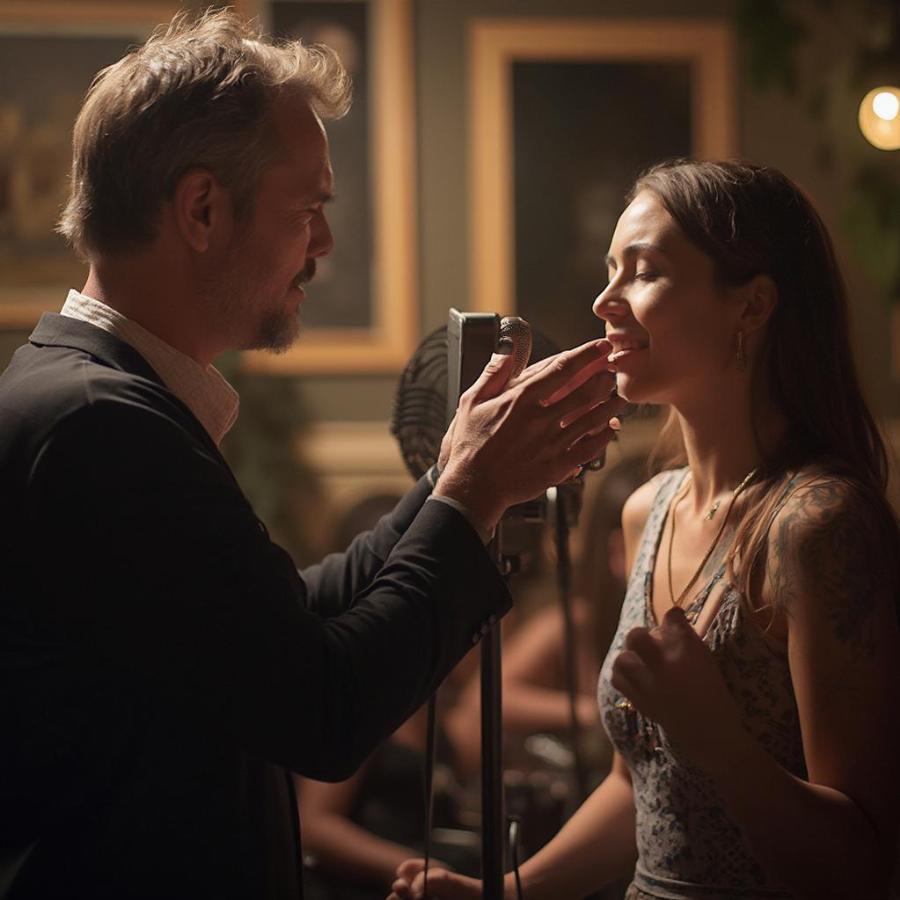Famous Stuttering Singers: Overcoming Challenges and Inspiring Millions

Famous Stuttering Singers demonstrate that a speech impediment is not a barrier to achieving vocal greatness. Many renowned vocalists have navigated the challenges of stuttering to reach the pinnacle of their musical careers, inspiring others who share similar experiences. Their stories are testaments to the power of perseverance, talent, and the transformative nature of music.
The Impact of Stuttering on Singing
Stuttering, a communication disorder characterized by disruptions in the flow of speech, can manifest in various ways, including repetitions of sounds, syllables, or words, prolonged sounds, and blocks where no sound is produced. While it might seem counterintuitive that individuals who stutter can sing fluently, the neurological processes involved in singing and speaking are distinct. Singing often engages different brain pathways, allowing those who stutter to bypass the typical speech disruptions they experience in everyday conversation. This phenomenon offers a fascinating glimpse into the complexities of the human brain and the therapeutic potential of music.
For many famous stuttering singers, the act of singing becomes a liberating experience, a sanctuary where they can express themselves freely without the constraints of their speech impediment. The rhythmic and melodic structure of music provides a framework that facilitates fluency, allowing them to communicate emotions and stories with clarity and power. This can be particularly empowering for those who struggle with self-expression due to their stutter.
Famous Stuttering Singers Who Found Their Voice
Throughout history, numerous singers have overcome stuttering to achieve remarkable success. These artists serve as powerful role models, demonstrating that stuttering does not have to define one’s potential. Their stories offer hope and encouragement to those who face similar challenges, proving that with determination and passion, anything is possible.
- Gareth Gates: This British pop star rose to fame in the early 2000s. Openly discussing his stutter, Gates has become an advocate for others who share his experience, inspiring countless individuals to embrace their own voices.
- Scatman John: Known for his unique blend of scat singing and jazz, Scatman John utilized his stutter as a musical instrument, incorporating it into his signature sound. His story is a powerful testament to turning perceived weaknesses into strengths.
- Bill Withers: This legendary soul singer and songwriter also experienced a stutter in his youth. His music, characterized by its raw emotion and honest lyrics, resonated with millions, solidifying his place as a music icon.
These are just a few examples of famous stuttering singers who have defied expectations and achieved greatness. Their achievements highlight the transformative power of music and the resilience of the human spirit.
How Singing Can Help with Stuttering
The therapeutic benefits of singing for individuals who stutter are well-documented. The rhythmic and melodic nature of music can help to regulate breathing and improve vocal control, contributing to increased fluency. Singing also provides a safe and supportive environment for individuals to practice self-expression and build confidence. This can be particularly beneficial for those who may feel self-conscious about their stutter in everyday conversation.
- Improved Breath Control: Singing requires controlled and regulated breathing, which can be beneficial for individuals who stutter, as irregular breathing patterns can exacerbate speech disruptions.
- Enhanced Fluency: The rhythmic structure of music provides a framework that can facilitate smoother speech flow, allowing individuals to bypass the typical stuttering blocks and repetitions.
- Increased Confidence: The ability to express oneself fluently through singing can boost self-esteem and confidence, empowering individuals to communicate more effectively in all aspects of their lives.
Finding Your Voice: Tips for Singers Who Stutter
For aspiring singers who stutter, there are several strategies that can help to enhance fluency and unlock their full vocal potential. These tips can empower individuals to overcome the challenges of stuttering and embrace the joy of singing.
- Practice Regularly: Consistent practice is essential for developing vocal control and improving fluency. Regular singing exercises can help to strengthen the muscles involved in speech production and improve breathing techniques.
- Work with a Vocal Coach: A qualified vocal coach can provide personalized guidance and support, helping singers to develop healthy vocal habits and address specific challenges related to stuttering.
- Embrace Your Unique Voice: Stuttering can be incorporated into a singer’s unique style, adding depth and character to their vocal performance. Embracing one’s individuality can be a powerful way to overcome self-consciousness and connect with audiences on a deeper level.

Conclusion
Famous stuttering singers have proven that a speech impediment does not have to limit one’s potential. Their stories inspire hope and demonstrate the transformative power of music. By embracing their unique voices and overcoming challenges, these artists have not only achieved personal success but have also become beacons of inspiration for others who stutter. Their journeys serve as a powerful reminder that with passion, perseverance, and the right support, anything is possible.
FAQ
-
Can stuttering be cured by singing?
While singing can significantly improve fluency for some individuals who stutter, it’s not considered a cure. It can be a powerful therapeutic tool, but stuttering is a complex condition that may require a multi-faceted approach to management. -
Do all singers who stutter experience fluency while singing?
Not all individuals who stutter experience complete fluency while singing, but many find that singing reduces the frequency and severity of their stutter. -
What are some other famous stuttering singers?
In addition to those mentioned, other singers rumored or confirmed to have stuttered include Elvis Presley and Carly Simon, though information can be limited depending on the artist’s openness about their experience. -
How can I find a vocal coach who specializes in working with singers who stutter?
Searching online for “vocal coaches specializing in stuttering” or “speech therapists for singers” can be a good starting point. You can also contact local music schools or speech therapy clinics for referrals. -
Are there support groups for singers who stutter?
Yes, there are online and in-person support groups specifically for people who stutter, and some may focus on the intersection of stuttering and singing. These groups can offer valuable peer support and resources. -
What are some tips for managing stage fright as a singer who stutters?
Practicing relaxation techniques, visualizing a successful performance, and working with a performance coach can help manage stage fright. -
Can stuttering affect my ability to learn new songs?
While stuttering can sometimes make it more challenging to learn lyrics initially, with patience and practice, it’s definitely possible to overcome this hurdle. -
Are there any specific vocal exercises that are particularly helpful for singers who stutter?
Breathing exercises, vocal warm-ups focusing on smooth transitions between sounds, and practicing rhythmic patterns can be beneficial. -
What should I do if I’m feeling discouraged about my stuttering as a singer?
Remember that many successful singers have overcome stuttering. Seeking support from a vocal coach, therapist, or support group can provide encouragement and help you develop strategies to manage your stutter and achieve your singing goals.




